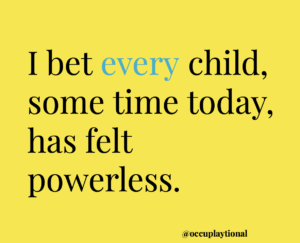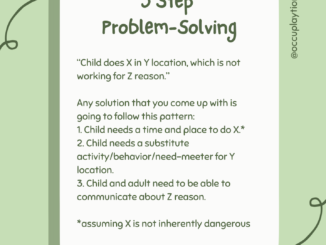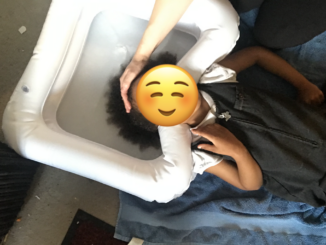Two stories about power and powerlessness.
A child and an adult were entering a classroom, together, one on one. The child skipped ahead of the adult through the open door of the classroom, zigzagged to the left and the right, saw the mini trampoline in the room and beelined toward that, did a single jump off of it, landed on the ground, walked to the table, and sat down where they were supposed to work.
The adult said, “That’s not how we walk in the hallway. You know better than that. Go back to the door and start over.”
The child looked at them sullenly. The adult snapped their fingers and pointed toward the door. “Show me walking feet and a calm body.”
The child stood back up from the table and trudged to the door, then turned around and trudged back, and sat back down in the chair.
Who had the power in this situation?
Who was made to feel powerless in this situation?
Here’s my second story.
A child and an adult were walking in the hallway together, one on one. They started to go up one of the stairwells to get to their classroom and the child said, “You need to walk on the right.”
The adult moved to walk on the right side of the stairwell.
The child said “actually I want to walk on your right. You walk on the left.”
The adult moved over to the left about halfway so the child could walk side by side with them and still hold the handrail.
The child said “move over, you’re in my personal space. And you’re supposed to hold the rail. It’s not safe to go on stairs without a rail.”
The adult moved all the way to the left.
When the two of them got to the stairway landing, the child said, “Now we have to switch. I walk on the left and you walk on the right.”
The adult moved to the right and walked up the rest of the stairs with the child.
Who had the power in this situation?
Who was made to feel powerless?
Those are a little bit of a trick question, because here’s the thing. I’m the adult in the second story, and at no time did I feel powerless.
In fact, it takes a little bit of time for me to come up with the last time I did feel powerless.
But if I asked a child — any child — when the last time they felt powerless was, and they were able to fully understand the question and give me an answer, you know what I bet they’d say?
Today.
I bet every child, some time today, has felt powerless. They routinely have rules, events, schedules, self-care decisions, even free time activities enforced on or taken away from them by other people, in a personal and in-your-face way that most adults don’t experience from the overarching structures in their life.

I might feel like I have to do something I don’t want to do because my boss said so, but in a healthy work environment, they’re probably not in my face or threatening to take away my ability to take breaks, go to the bathroom, or walk down the hallway.
I might spend my free time doing something I’m reluctant about for the sake of my partner, child, or another family member—like watch a show I don’t really like, listen to someone talk on and on about a video game I don’t get, or spend my time driving somebody around for extracurriculars. But my brain still belongs to me during that time. I can zone out or think about something else. My emotions still belong to me. I can be grumpy or annoyed or tired or slow to respond or however I feel.
But for many kids, it is actually a regular part of their life to have their basic needs dictated to them by adults, if not outright threatened. And for many kids, if their brain and their emotions aren’t responding the way someone else thinks they ought to, then they’re at risk.
I don’t have to sit in chairs or on toilets or stand at counters and sinks or reach for light switches that are obviously, plainly designed to not be for me. I don’t navigate a world that reminds me continuously that it wasn’t designed for me. And–and this is a big one!–people generally treat me like I’m competent, like I can make my own decisions, like I’m a generally intelligent person unless I’m actively proving myself to be otherwise. People generally give me the benefit of the doubt in interactions. I start off on neutral or even good footing.
But kids spend all day every day navigating a world that reminds them in a thousand ways, not the least of which is literal size, that it wasn’t made for them and is everything from exclusionary to outright hostile towards them. And when they encounter new adults, they’re very, very likely to be condescended to, treated as incompetent, treated as unintelligent, treated like a baby–or alternately, held to way too high of standards for them to possibly be capable of reaching and then when they inevitably fail, blamed for their own failure.
It’s a minefield out there to be a child.
It is very, very disempowering to be a child.
That’s something to keep in mind in our interactions with children. They might seem routine to us, or like no big deal. Some small correction or thing that we think they could be doing better, differently, or more efficiently. But…how necessary is every single small thing? Could it be the straw breaking the camel’s back? Is there a way to do this that doesn’t necessitate wielding our power over a child, but could instead look like coming alongside them as a team?
***
This was the first several minutes of a virtual lecture I recently had the privilege of giving as a professional development training for teachers in a school in Salt Lake City, Utah. I will make the slides and the recording available eventually, to share my words with people who learn in a more auditory medium!



